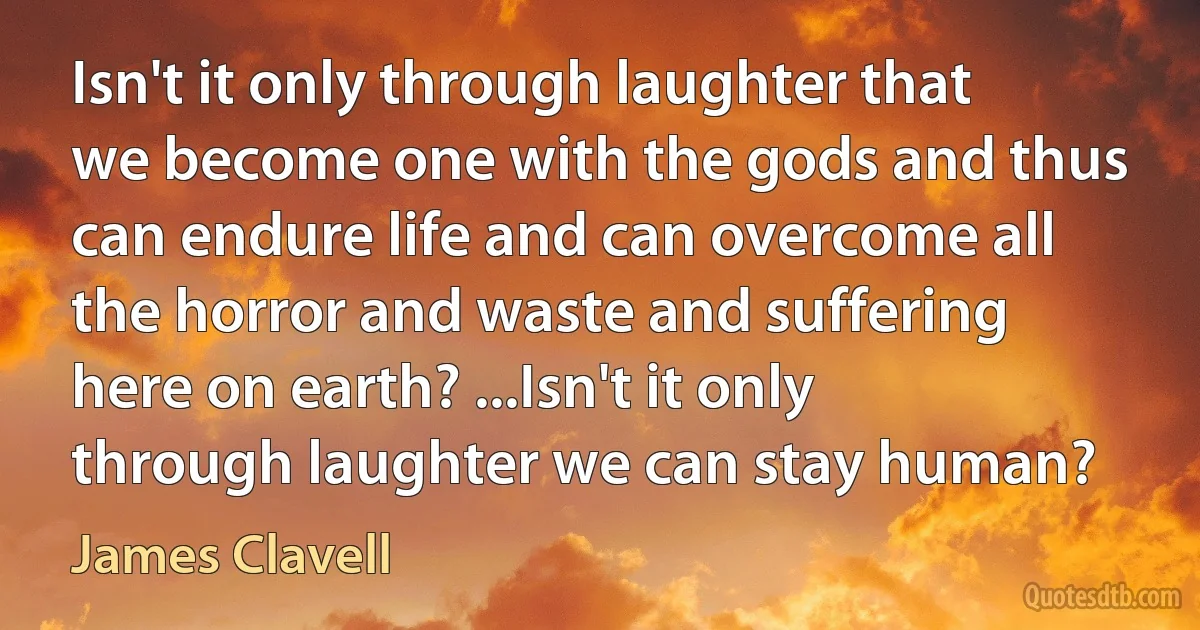Gods Quotes - page 27
Never forget I am not this silver body, Mahrai. I am not an animal brain, I am not even some attempt to produce an AI through software running on a computer. I am a Culture Mind. We are close to gods, and on the far side. We are quicker; we live faster and more completely than you do, with so many more senses, such a greater store of memories and at such a fine level of detail. We die more slowly, and we die more completely, too.

Iain Banks
A growing belief that behind every event lay intention-be it an evil thought in the mind of another, or the benevolent whim of a god in the sky-was perhaps inevitable in creatures with an innate understanding of causality. If you were smart enough to make multicomponent tools, you eventually came to believe in gods, the end of all causal chains. There would be costs, of course. In the future, to serve their new gods and shamans, the people would have to sacrifice much: time, wealth, even the right to have children. Sometimes they would even have to lay down their lives. But the payback was that they no longer had to be afraid of dying.

Stephen Baxter
On this occasion, despite the wind and sparkling stars, they looked just like huge chunks of stone, pathetically chiseled by desperate folk to resemble stern gods. People did bizarre things when they were afraid...as most men and women had been for nearly all the time since the species evolved.

David Brin
She hath wasted with fire thine high places,
She hath hidden and marred and made sad
The fair limbs of the Loves, the fair faces
Of gods that were goodly and glad.
She slays, and her hands are not bloody;
She moves as a moon in the wane,
White-robed, and thy raiment is ruddy,
Our Lady of Pain.

Algernon Charles Swinburne
For, for aught we know, or for aught that the new science can say to the contrary, the gods which play the part of fate to the atoms of our brains may be our own minds. Through these atoms our minds may perchance affect the motions of our bodies and so the state of the world around us. To-day science can no longer shut the door on this possibility; she has no longer any unanswerable arguments to bring against our innate conviction of free-will. On the other hand, she gives no hint as to what absence of determinism or causation may mean. If we, and nature in general, do not respond in a unique way to external stimuli, what determines the course of events? If anything at all, we are thrown back on determinism and causation; if nothing at all, how can anything ever occur? As I see it, we are unlikely to reach any definite conclusions on these questions until we have a better understanding of the true nature of time.

James Jeans
In opposition to the aristocratic valuation (good = noble, beautiful, happy, favoured by the gods) the slave morality then is this: The wretched alone are the good; those who suffer and are heavy laden, the sick and the ugly, they are the only pious ones. On the other hand, you, ye noble and rich, are to all eternity the evil, the cruel, the insatiate, the ungodly, and after death the damned. Whereas noble morality was the manifestation of great self-esteem, a continual yea-saying, slave morality is a continual Nay, a Thou shall not, a negation. To the noble valuation good bad (bad = worthless) corresponds the antithesis of slave morality, good evil. And who are the evil in this morality of the oppressed? Precisely the same who in the other morality were the good.

Georg Brandes
It's what they call a "theocracy”-priest-ridden in the extreme, full of dark superstitions and darker myths and legends, where all gods and demons are honoured, doubtless to be on the safe side. The people are cruel, ignorant, dirty and proud-they look down their noses at all other races.

Michael Moorcock
When, in our civilized Europe, we would find a trace of the native beauty of man, we must go seek it in the nations where economic prejudices have not yet uprooted the hatred of work. ... The Greeks in their era of greatness had only contempt for work: their slaves alone were permitted to labor: the free man knew only exercises for the body and mind. ... The philosophers of antiquity taught contempt for work, that degradation of the free man, the poets sang of idleness, that gift from the Gods.

Paul Lafargue
The great Egyptian age is but a remnant of The Atlantian culture.
The antediluvian kings colonised the world
All the gods who play in the mythological dramas
In all legends from all lands were from fair Atlantis.
Knowing her fate, Atlantis sent out ships to all corners of the Earth.
On board were the Twelve:
The Poet, the Physician, the Farmer, the Scientist,
The Magician and the other so-called Gods of our legends.
Though gods they were -.

Donovan
Alexander sacrificed to the gods to whom it was his custom to sacrifice, and gave a public banquet, seated all the Persians, and then any persons from the other peoples who took precedence for rank or any other high quality, and he himself and those around him drank from the same bowl and poured the same libations, with the Greek soothsayers and Magi initiating the ceremony. Alexander prayed for various blessings and especially that the Macedonians and Persians should enjoy harmony as partners in government. The story prevails that those who shared the banquet were nine thousand and that they all poured the same libation and gave the one victory cry as they did.

Arrian



